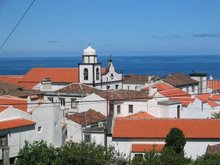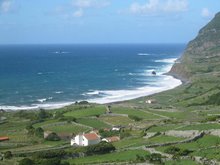 |
| Hart Jimmy |
Saturday, 30 June 2012
Lookalike
Has anyone else noticed the uncanny resemblance between England and Man City goalkeeper Joe Hart and 80s comic [using the expression in its loosest possible sense] Russ "See you Jimmy" Abbott?
Perhaps they could change the rules in time for Dois Mil e Catorze so that Ant & Dec could be in goal.
Sunday, 10 June 2012
Dois Mil e Doze
Nick Hornby summed the syndrome up memorably in Fever Pitch:-
"I was going to say 1980 was a torpid, blank, directionless year for me but that would be wrong; it was 79/80 that was these things. Football fans talk like that: our years, our units of time, run from August to May (June and July don't really happen, especially in years which end with an odd number and therefore contain no World Cup or European Championship)."
I wouldn't go so far as to say I'm a football fan but I do enjoy my summer international football competitions and I share Hornby's pain in odd years. Portuguese TV has a habit of emphasising the year when referring to international competitions, so this summer of EURO2012 is very much Dois Mil e Doze where last summer was plain old 2011.
Portugal has had the misfortune to end up in the Group not so much of Death as Total Annihilation With Your Remains Being Vapourised And Projected Into A Parallel Space Time Continuum. How unlucky is it to be ranked tenth in the world and still be the lowest in your Group (the others being Germany (3), Holland (4) and Denmark (9))?
In the opening Group B matches this evening, Denmark beat Holland 1-0 while Germany beat Portugal 1-0 but with Portugal having had some bad luck and not having been a pushover by any means.
Meanwhile, jammy Ingerland (6) have landed up with France (14), Sweden (17) and Ukraine (not even on the list I printed off) in the Group of "Ought To Be A Breeze To Qualify From But Good Chance They'll Screw It Up Royally Leading To Tabloids Screaming For Woy's Blood, Terry Never Playing For Ingerland Again, Should Have Taken Ferdinand, Told You So".
For the avoidance of doubt (as we lawyers say when in fact we're adding to it massively), I hope Ingerland do screw it up royally in the group phase (like France in Dois Mil e Dez) but if they do get through, then I will support them after Portugal have gone out. (Ideally, I'd like to see France fail to go through as well although that might be too much to hope for again.)
Scotland, I need hardly add, failed to qualify for EURO2012, having buggered up some challenging matches against Liechtenstein and the Faeroe Islands in the Group of Having a Tickly Throat in the qualifiers. It'll be different in the future, though - Uncle Alex says if we become independent, we'll qualify in Dois Mil e Catorze and triumph in Dois Mil e Seize.
"I was going to say 1980 was a torpid, blank, directionless year for me but that would be wrong; it was 79/80 that was these things. Football fans talk like that: our years, our units of time, run from August to May (June and July don't really happen, especially in years which end with an odd number and therefore contain no World Cup or European Championship)."
I wouldn't go so far as to say I'm a football fan but I do enjoy my summer international football competitions and I share Hornby's pain in odd years. Portuguese TV has a habit of emphasising the year when referring to international competitions, so this summer of EURO2012 is very much Dois Mil e Doze where last summer was plain old 2011.
Portugal has had the misfortune to end up in the Group not so much of Death as Total Annihilation With Your Remains Being Vapourised And Projected Into A Parallel Space Time Continuum. How unlucky is it to be ranked tenth in the world and still be the lowest in your Group (the others being Germany (3), Holland (4) and Denmark (9))?
In the opening Group B matches this evening, Denmark beat Holland 1-0 while Germany beat Portugal 1-0 but with Portugal having had some bad luck and not having been a pushover by any means.
Meanwhile, jammy Ingerland (6) have landed up with France (14), Sweden (17) and Ukraine (not even on the list I printed off) in the Group of "Ought To Be A Breeze To Qualify From But Good Chance They'll Screw It Up Royally Leading To Tabloids Screaming For Woy's Blood, Terry Never Playing For Ingerland Again, Should Have Taken Ferdinand, Told You So".
For the avoidance of doubt (as we lawyers say when in fact we're adding to it massively), I hope Ingerland do screw it up royally in the group phase (like France in Dois Mil e Dez) but if they do get through, then I will support them after Portugal have gone out. (Ideally, I'd like to see France fail to go through as well although that might be too much to hope for again.)
Scotland, I need hardly add, failed to qualify for EURO2012, having buggered up some challenging matches against Liechtenstein and the Faeroe Islands in the Group of Having a Tickly Throat in the qualifiers. It'll be different in the future, though - Uncle Alex says if we become independent, we'll qualify in Dois Mil e Catorze and triumph in Dois Mil e Seize.
Friday, 8 June 2012
The 4th Verse
With the British national anthem having been heard more often than usual in the last few days due to the Diamond Jubilee celebrations marking the 60th anniversary of Her Majesty's accession to the throne of the United Kingdom, it's timely to be reminded of the fourth verse of "God Save the Queen" as composed in the 1740s:-
Lord, grant that Marshal Wade,
May by thy mighty aid,
Victory bring.
May he sedition hush,
and like a torrent rush,
Rebellious Scots to crush,
God save the King.
 |
| Rebellious Scots being crushed |
Marshall Wade was the Commander in Chief of the British Army during the Jacobite Rebellion of 1745-46. He'd been relieved of his command by the time the rebellion was finally crushed at the Battle of Culloden (pictured above - last pitched battle to be fought on British soil in April 1746) and is better remembered (as General Wade) for the military roads he built in Scotland in the 1720s.
 |
| One of General Wade's military roads from the 1720s |
Whatever. The message of the forgotten fourth verse of the National Anthem is as relevant today as it was in the 1740s.
 |
| Rebellious Scot needing crushed |
Subscribe to:
Comments (Atom)









